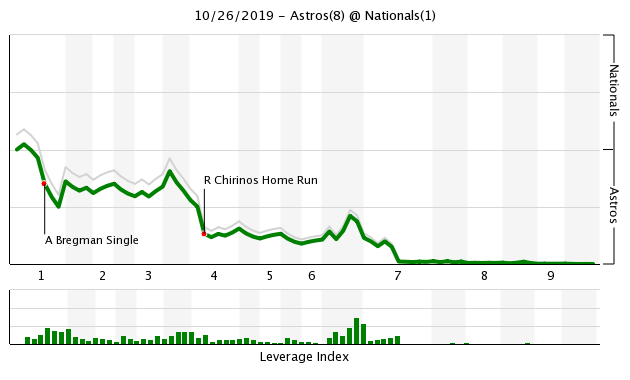Fresh from the unpleasant surprise department, the Washington National announced Sunday afternoon that Max Scherzer would be scratched from his Game 5 start. Scherzer has suffered neck pain in recent days and in the words of Nationals GM Mike Rizzo, is in “ungodly pain.” In for Game 5 is Joe Ross, whose only appearance so far this postseason was when he threw two shutout innings of relief in Washington’s Game 3 loss to Houston.
Considering that at times this postseason Scherzer has looked as if he would have to be dragged from the mound by a full SWAT team, I would imagine there’s not a great deal of hyperbole involved in the description of his pain. The Silver Hammer’s replacement, Joe Ross, fared well in 2019 when used as a starter, allowing a 3.02 ERA and 3.86 FIP in nine starts, all in the second half of the season. Ross, who once assisted shortstop Trea Turner in making the Wil Myers three-way trade look like a disaster for the non-Washington teams, has otherwise had his career waylaid by injuries.
The larger question, of course, is just what this means for Washington’s bottom-line playoff odds. Initially coming into Game 5, ZiPS projected the Astros to have a 61%-39% edge to win the series. But what scenario are we exactly projecting now? The answer depends on what actually happens with Scherzer’s injury, which is speculation at this point.
Ross’ start is essentially forced by the Nationals’ relief corps. Washington doesn’t have the arms to make a bonafide bullpen game a palatable scenario to the team, and with Austin Voth off the roster, they can’t start him without ruling another pitcher out due to injury. In any case, the Nats certainly don’t want to rule out Scherzer’s return unless they absolutely have to, and one would imagine the league looking very closely at the situation if Fernando Rodney or Tanner Rainey were to “suddenly” suffer injuries that necessitated them being replaced on the roster.
For the ZiPS World Series probabilities, I’m going with the happy scenario for now: Ross starts tonight, with Stephen Strasburg going in Game 6, and Scherzer left for a return in a possible Game 7. If you look at the probabilities right now, you’ll actually see the Nationals’ championship probability get a small bump to a 40%/60% deficit. ZiPS is a noted Aníbal Sánchez skeptic, and projects Ross as a minor improvement, by about two-tenths of a run per nine innings.
That, of course, doesn’t mean that this is welcome news for the Nationals, only that it’s beneficial in one very specific scenario, one the Nationals are far from guaranteed to see. To get an idea of the probabilities in some of the scenarios that are far uglier for the Nats, I re-ran the probabilities with a few of the possibilities, and condensed them into one pretty little chart!
ZiPS World Series Probabilities, Scherzer Scenarios
| Scenarios |
Nats Championship |
| Scherzer pitching in Game 5 as intended, Scherzer-Strasburg-Sánchez |
39% |
| Scherzer Game 7, pitching normally, Ross-Strasburg-Scherzer |
40% |
| Scherzer Game 7, ERA 10% worse than projection, Ross-Strasburg-Scherzer |
38% |
| Scherzer Game 7, ERA 30% worse than projection, Ross-Strasburg-Scherzer |
36% |
| Ross-Strasburg-Sánchez, Scherzer healthy enough for 2 relief innings Game 7 |
37% |
| Ross-Strasburg-Sánchez, Scherzer out for playoffs |
35% |
| Ross-Strasburg-Voth, Scherzer out for playoffs, Sánchez to bullpen |
37% |
Losing Scherzer for the rest of the World Series would be the worst-case scenario for the Nationals, but not one that dooms them. People tend to drastically overrate the dependability of a great starter’s excellence or a lousy starter’s ineptitude in an individual game. As terrific as Scherzer is, even in his best season, he was “only” worth 0.23 WAR per start, and was “just” 0.17 WAR better than the average pitcher. You want your best pitchers in the actual games, but even without Scherzer, who wins the series will come down to a lot more than his attendance.


